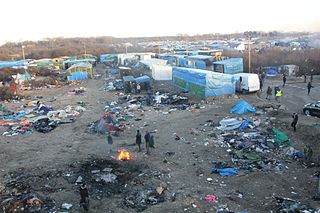Caroline Nokes announces new leave for children transferred from Calais to the UK to reunite with family
The immigration minister Caroline Nokes announced yesterday that the Government is creating a new form of leave for children transferred to the UK to reunite with their families during the closure of the Calais refugee and migrant camp in 2016.
 It will mean that those children who do not qualify for international protection under existing immigration rules will still be able to remain in the UK.
It will mean that those children who do not qualify for international protection under existing immigration rules will still be able to remain in the UK.
According to the Home Office, the new Calais Leave will be available to those brought over as part of the Calais clearance exercise between October 2016 and July 2017, who were under the age of 18 at this time, and who had recognised family ties in the UK.
In a written statement to the House of Commons, Caroline Nokes said:
"As part of the clearance of the Calais camp in October 2016 the Government transferred 769 unaccompanied children to the UK, all of whom claimed Asylum in the UK. The Government acted decisively at this time to remove vulnerable children from a dangerous situation where they were at risk of violence and abuse. The unique situation in Calais and unprecedented action we took to safeguard children demonstrated the Government's commitment to supporting the most vulnerable children affected by the migration crisis.
"Of the 769 cases, 220 cases were transferred in accordance with s67 Immigration Act 2016 (''the Dubs amendment), and formed the first tranche of these cases. Some of these cases did not qualify for Refugee or Humanitarian protection under the existing rules, as such, in June 2018 we introduced a new form of leave (section 67 leave) for these cases.
"The remaining 549 cases were transferred to reunite with family members already in the UK. These cases have been considered carefully and on their individual merits, and a large proportion of these cases have been recognised as refugees.
"It is our view that all those 549 transferred from Calais to the UK to reunite with family should be able to remain here with their family members. In keeping with our commitments to family unity, we do not consider that it would be in their best interests to separate children from their families, having received significant support from UK authorities to reunite and integrate.
"It is our intention to introduce, by laying a new Immigration Rule, a new form of leave for any of these cases that have not already been considered refugees. This leave will only be available for those that were bought over as part of the Calais clearance exercise in October 2016, who were under the age of 18 at this time, and who had recognised family ties in the UK. Individuals who qualify for this leave will have the right to study, work, access public funds and healthcare, and can apply for settlement after ten years."
Judith Dennis, Policy Manager at the Refugee Council, welcomed the immigration minister's announcement and said:
"This is very welcome news to the children concerned and their families, many of whom took on the care of their young relatives at very short notice when they were brought from the dire situation in which they'd been living in Calais. Children separated from family and seeking international protection are some of the most vulnerable in the UK. We hope this shows a move towards thinking of children's best interests in all decisions that affect them, including claims for asylum."